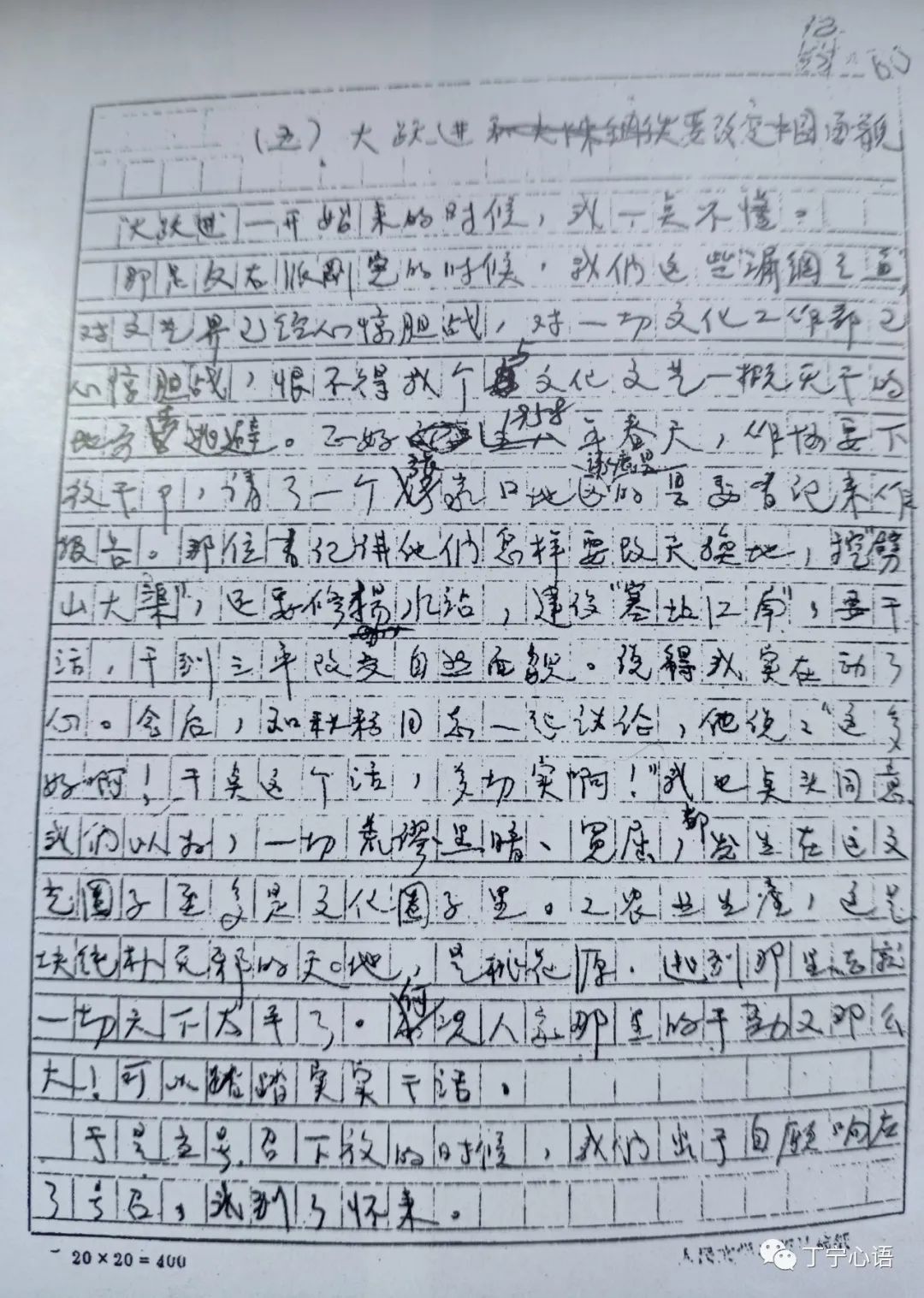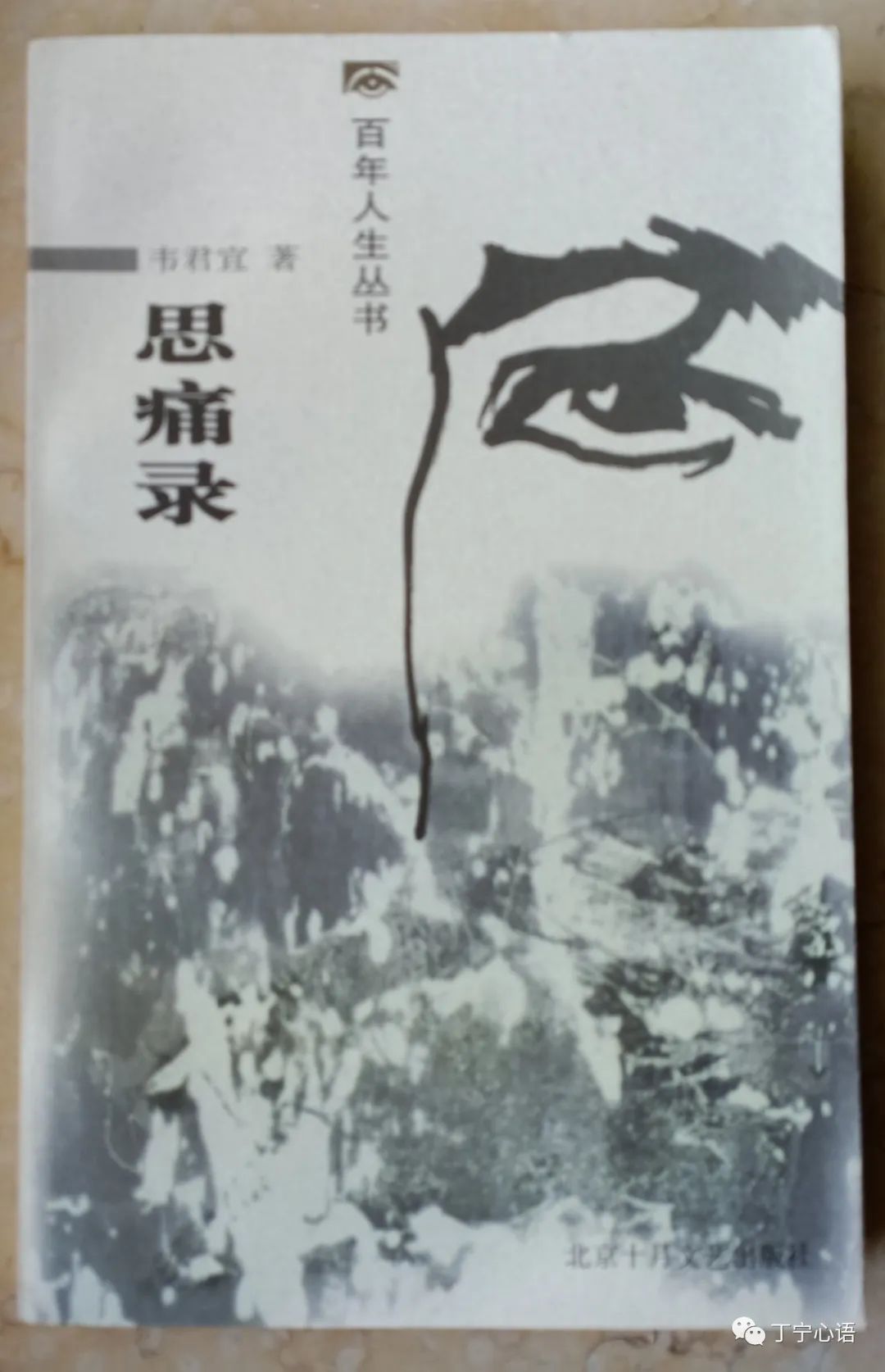
对49年以后中国历史感兴趣,鉴于中文互联网有关的记忆和记载正在被大规模地有计划地移除,本博主要用作收集网络“垃圾”,“拯救”网络记忆和记载,可能偶尔会有点原创,稍微会转一点资料性强创见多的不被主流刊载的学术性文章。另外,凡华夏文摘刊登过的文章一般不cross post,当然也会有例外,视情况而定。
Ding Ning's "Thinking of Pain" was published
At the end of 1997, the Beijing October Literature and Art Publishing House, where I worked, put forward a set of ideas for the selection of topics. At the turn of the century, a series of books on a hundred years of life were launched. Through the old people’s retrospective life experiences, they reflected the changes of a century of history, and recorded the mental journey of intellectuals. The first one is Zhou Liang's "After all, a scholar". After this book was published, the editor in charge, Han Jingqun, proposed the topic of this series. To this end, we all acted, contacting the author everywhere, and I was actively involved.
I started looking for people around me. I asked my brother Ding Dong if he could provide clues. He told me that writer Wei Junyi wrote his memoirs, and that he had read some chapters in "The Hundred Years Tide", "The Yellow River", "Prose and People", and he felt great. I was so happy that I quickly reported to the editor-in-chief Li Zhiqiang. I told Lao Li that I heard that the manuscript was in Mu Hui's hands, and I wondered if I could go and get the manuscript. Old Li said that Mu Hui's self-report was not satisfactory, but Wei Junyi's should be able to.
At that time, Wei Junyi had had a stroke for many years and was bedridden, so she entrusted the manuscript to her in-laws, Mu Hui. This manuscript has contacted some publishers, but they have not been successful. In December 1997, Wei Junyi was 80 years old. At the birthday party, Yu Guangyuan urged Mu Hui to help her realize her wish to publish this book. I've heard that the author's only requirement is to see the book published in his lifetime. Lao Li said, go get it! We do everything we can to get out. Lao Li gave Shang Fang the sword, and I made an appointment with Ding Dong and went straight to Mr. Muhui's house on the beach to pick up the manuscript.
Mr. Muhui is an essayist. I guess he should be very angular. When I arrived at his house, I saw a thin, kind and amiable old man who opened the door.
I looked at the manuscript and knew that this was Wei Junyi's last work. In the early 1990s, Wei Junyi, who was ill, entrusted this manuscript to Mr. Muhui. Previously, Mu Hui had made great efforts to publish this book, but it still failed. He told me that Wei Junyi's life was at stake and her mind was still awake. She was eager to publish this book, or she would die.

I took out the prepared contract and handed it to Mr. Muhui. I said that the book must be published as soon as possible. Mr. Muhui is very happy. The manuscript fee standard written on the contract is 45 yuan per thousand words. Ding Dong approached and said, let's pay by royalties. I said, if I want to make changes, I can't make a decision, and I have to go back to the club to ask for instructions again. When Mu Hui heard this, she said that she just wanted to get out quickly, and there were no other conditions. He asked me if I could publish a book in two months. I said, let's sign for three months, we must not delay. So, I signed a contract on the spot and saw the book at the end of May. Mr. Muhui trusted me to bring back the manuscript.
When I got the manuscript, I read it through the night. After reading the book, I was deeply moved. The book unfolds as a self-report, and the author chooses a unique perspective, which is the various movements she has personally experienced. People who have not experienced sports really have a hard time understanding what sports are. They don't know how cruel and shocking it is to surrender dignity, personality, and conscience!
Reading this book, I was struck by how deep the author's recall tentacles probed. She made me re-acquainted with Mr. Wei Junyi. I am both happy and worried. I am happy that I have a good book, but I am worried that if the book doesn't come out, how will I explain it!
I made a report to Lao Li. Lao Li said, show me the manuscript. After reading it, he said, I can read this book. This is a book about a literate old man telling the truth. Just delete a little somewhere. With the words of Lao Li, my heart is half at ease.
So, I quickly edited and processed. Since this manuscript was written by Wei Junyi on his sickbed in his later years, there are many jittery characters that are not easy to identify, and there are omissions in the writing. I made the necessary corrections. But this is not the main difficulty, the difficulty is how to avoid risks. In order to avoid risks, we have deleted some names; we have also deleted some words that are too heavy. For example, Wei Junyi wrote: "At that time, there was a central document, and the first sentence was: 'It's not surprising that there are so many secret agents.' Who can write this kind of text in the document? I'm guessing that Kang Sheng can only write it. Come up with a 'rescue the stray'." Even if Wei Junyi had seen such a document, for the sake of insurance, he still deleted these few sentences. For another example, Wei Junyi wrote when he recalled the anti-rightist movement: "At that time, I had a vague feeling that the central government did not want these outstanding cadres who emerged from the student movement, and that these are just young and strong talents who can make a difference. What is the reason? It is nothing more than that They are somewhat brainy and young, and it is impossible for them to 'respond to all the party's calls' completely without their brains, as I have done, and I am now suffering from a little thinking." In this case, the editor It was also deleted during processing.
We have combined the "origin" and "beginning" in the original manuscript. She also had a chapter on the last movement of her life that had to be removed. A total of about 10,000 words have been omitted. After the second and third trials, the manuscript finally completed all the procedures.
The review report I wrote summarizes the advantages of this manuscript:
First, the writing attitude is extremely sincere, and there is no pretence at all. The author simply and honestly goes back to the past. The whole manuscript does not rely on discussion to elevate anything, but shows some historical facts, events, and characters. In the author's real memories, let people revisit the past events; those people and events, described by her brushstrokes, can't help but make people fall into the big thinking of right and wrong. She has been in contact with many celebrities and dignitaries in the political and cultural circles. People often don’t know much about these characters, and they just watch from a distance, so they cannot be regarded as flesh-and-blood people and walk into their inner world. And Wei Junyi's self-report helps people to understand their truth in history and uncover the mystery of history. For example, when she wrote about Zhou Yang, she vividly and concretely expressed the inner pain of a person who had rectified many people and later rectified herself, who had been the head of the party's literary and artistic work for many years, so that people could not understand the invisible power of history. It felt very real.
Second, the characteristics of realism are very prominent. The writing movement is here, and everyone has "sports birthmarks". The book describes that everyone in the movement showed themselves tenaciously for self-protection. Those vivid descriptions made people feel very sad when they read them. For example, when she writes about Zhou Yang, she is also reflecting on and repenting of herself. She has been writing about her own mental journey, not in general retrospect, but in reflection and regretting yesterday. As she said, the reflection of their generation is at the cost of all their lives and pain, which makes future generations feel the heaviness of history more and more. Wei Junyi wrote that she was rectified in Yan'an, and that she changed roles later, and also rectified others. Her confession is especially thought-provoking because of its sincerity.
"Thinking Pain" is simple and plain, and it is easy to tell. After reading it, I could not calm down. Wei Junyi wrote about his husband Yang Shu, not generally describing how he was honest and upright, and how loyal he was to the revolutionary cause, but about an intellectual who was brilliant, sharp-minded, and devoted himself to the revolution, how he gradually lost himself, how Confused and numb. She sadly wrote that when Yang Shu died, she felt how unfair she was to him, and she also participated in the suppression and persecution of him. In her mourning, she contained a silent accusation, and in her memorial, she implied a condemnation of injustice.
We complete the editing process in a loop. When the printing was about to start, another wave of situations occurred. Wei Junyi was almost branded a rightist in 1957, but was spared by Jiang Nanxiang's help. This is mentioned in the memoir, as well as the fact that he labeled others as rightists. For this reason, the wife called the United States to put pressure on Wei Junyi's daughter, who was on a business trip at the time. At this time, Wei Junyi's son-in-law was facing promotion, and they asked whether the publication could be postponed. Mr. Muhui knew that publishing opportunities were hard-won, resisted the pressure and did not agree to delay the publication.
On May 12, 1998, "Thinking Pain" finally came out, 18 days earlier than the contract period. I took the sample book, and together with Mr. Mu Hui, I immediately rushed to Wei Junyi's bed and delivered the book to her. Wei Junyi was speechless, but he could see that he was very excited. Mu Hui was also very excited, he said, "I finally completed the task that Yu Guangyuan gave me with tears!"

After the book was put on the market, it was repeatedly sold out, and it was printed four times in two months. Wei Junyi's daughter found the publishing house and proposed to change the contract from royalties to royalties. The leader of the agency said that from now on, the contract can be re-signed and changed to royalties; there is no way to change the previous part. Later, when the contract expired, the book was transferred to the People's Literature Publishing House where Wei Junyi worked during his lifetime. Unfortunately, the version used is still our abridged version. I hope that one day in the future, "Thinking Pain" will be available to readers in the form of a completed version.
This book is one of the most memorable of my three decades of editing, and one of those manuscripts that I knew was valuable but had to cut out. Being both a midwife and a "butcher" is both gratifying and regretful.
https://mp.weixin.qq.com/s?__biz=MzI5NDk1NzIwOA==&mid=2247483981&idx=1&sn=a287cd3271447eff872168aa0161644f&chksm=ec5bbbbadb2c32acbe3904926a04e3f697f78dce004d1b8e15ebb3d9f02bf1bee6dc6e5d4818&scene=21#wechat_redirect
Like my work?
Don't forget to support or like, so I know you are with me..
Comment…